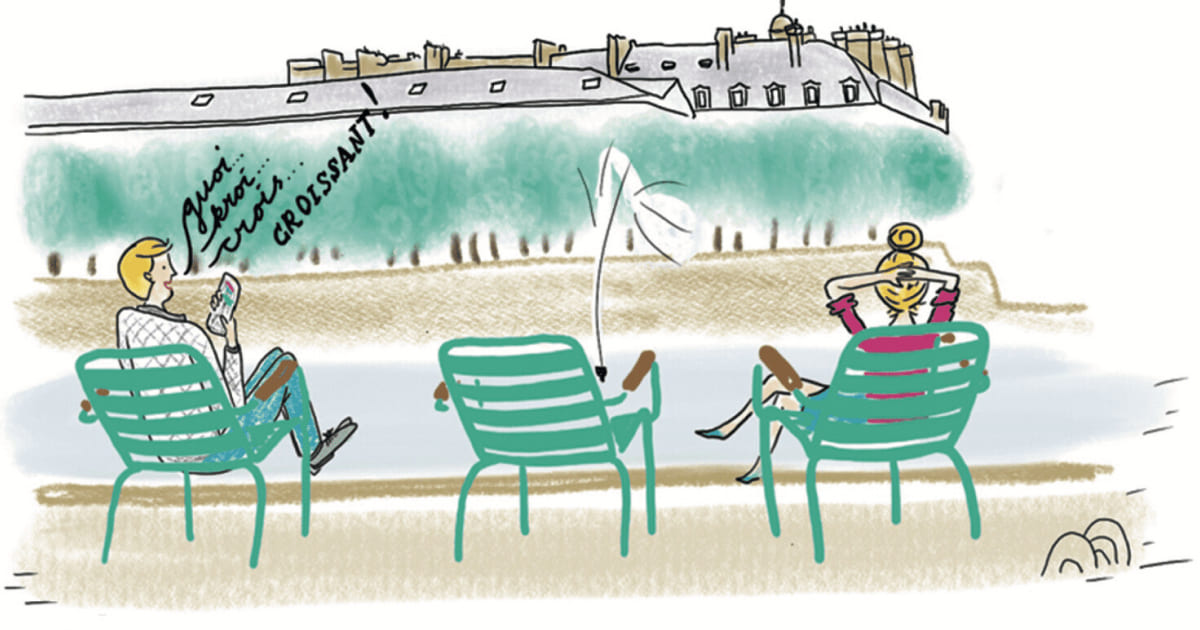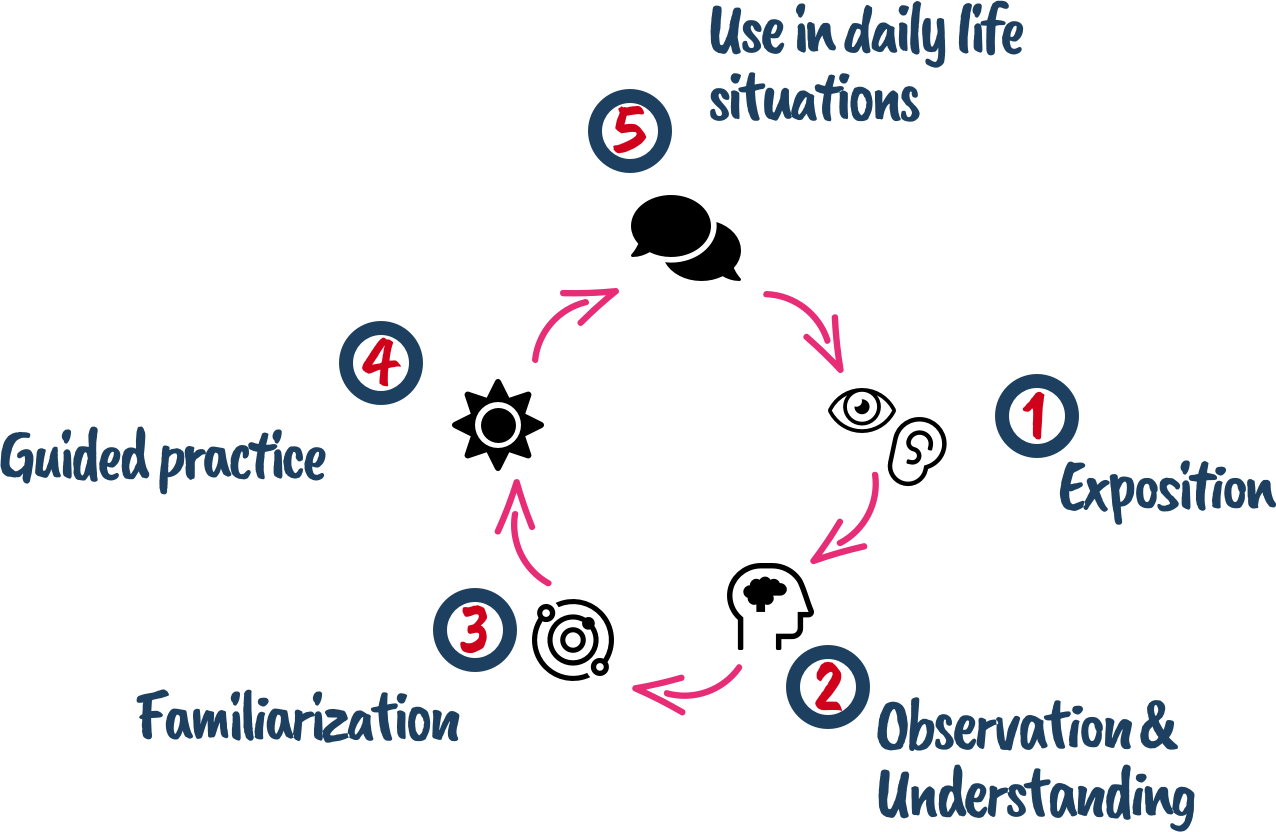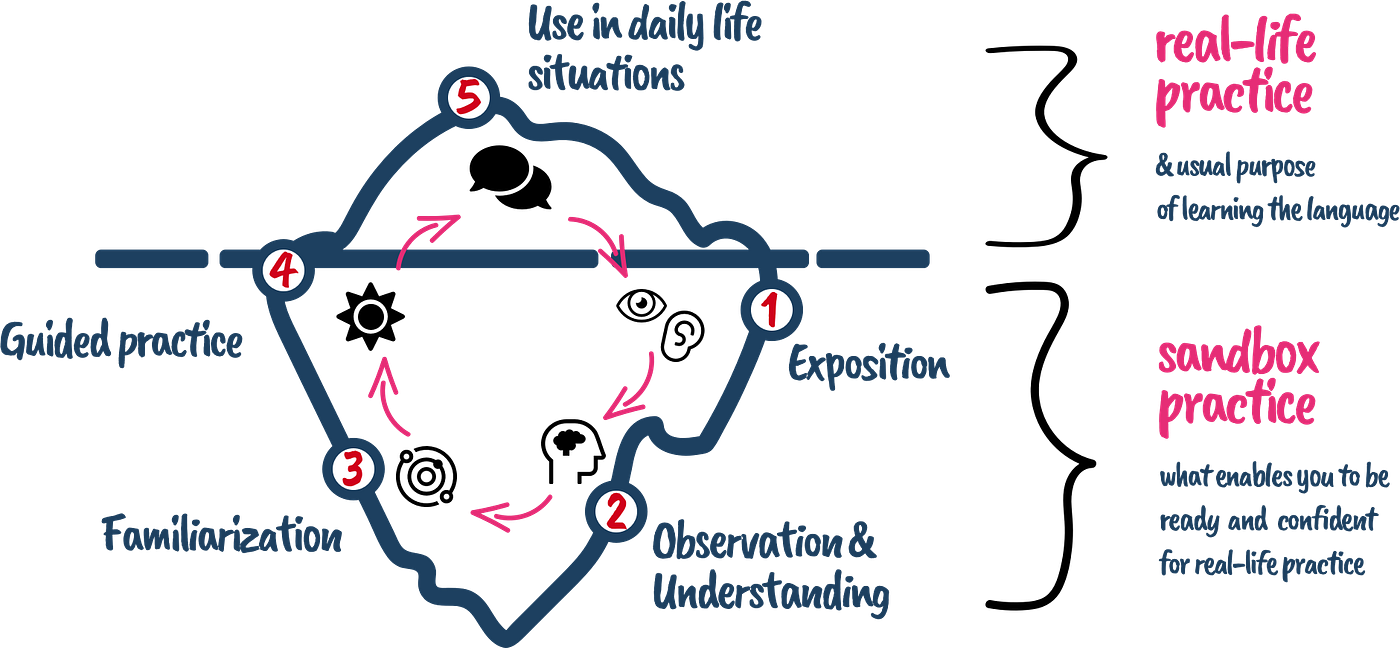How to practice French independently
Improve comprehension, vocabulary, and confidence with proven methods that don't require in-person conversations with French locals.

Gaining French fluency without direct interaction with locals is possible
As a French language teacher, I told my students over and over that they need to practice as much as possible to significantly improve their French skills and build up their confidence. While it's fantastic to practice with native speakers, sometimes it's just not feasible to be in France or to meet in person. So, how can we practice in ways that don't depend on direct contact?!
If you are like my students who are eager to improve, the situation can be wildly frustrating. Perhaps you're saying to yourself right now: “Fabienne, thanks for your wise advice. But I can't often get to speak with native speakers. How can I really improve?”
Your situation is not as bad as you perceive IF you understand the full scene behind the cycle of your French learning journey. Indeed, there is a big part of your learning cycle that is more about going out and practice in real-life situation.
It is what I called the Sandbox Practice. It is about knowing a proven learning cycle so that you can leverage every opportunity in all circumstances of life to level up.
French Learning Cycle: the concept of Sandbox Practice
An efficient language learning cycle can be represented in the following 5-step virtuous process, each step having its own role to play and its contribution to make.

- 👁 👂 Exposition: I see and or listen to the language in a specific context.
- 🧠 Observation and understanding: I observe and try to understand how the language is used.
What is the social or cultural context? Which structures are used (grammar and tenses)? What's the meaning of the words?… - 💫 Familiarization: I get familiar with the new concepts observed.
For instance: through short oral or written training exercises (grammar exercise, creating examples, micro questions and answers dialogs…) - ☀️ Guided practice: I practice it in a safe and guided environment.
Through contextualized conversations, writing text, watching a video or listening to a podcast on a related topic... - 💬 Use in daily life situation: I reuse what I've learnt, with unknowns (at the groceries', in the bus, at your children' school, at restaurant…), with your neighbors, your family in law, your colleagues, your friends or their friends…
In this 5-step learning cycle, steps 1 to 4 form what I call the Sandbox Practice, which builds your foundation in French before diving into real-life conversations. This sandbox is where you develop the essential skills, exposure, observation, familiarization, and guided practice, without the pressure of immediate, real-world interaction. Think of these steps as the unseen part of an iceberg: solid and extensive beneath the surface, they support and strengthen your confidence for when you're ready to tackle real-life practice in step 5.
While real-life practice is often the ultimate motivation for learning a language, it's only the tip of the iceberg; the Sandbox Practice is what enables you to approach it confidently and successfully.

While practicing with native speakers face-to-face is beneficial, steps 1 to 4 of the sandbox method provide powerful ways to advance your French anytime, anywhere. These steps ground you and make you invincible at interaction in French. And yes, to complete them, no interaction with native locals is required.
In the rest of this article, I will give you some concrete examples of exercises and practices that you can easily implement and select according to the objectives and skills you would like to boost.
Powerful resources for sandbox practicing your French
Here is a list of powerful sandbox exercises and practices that I give to French learners that want to accelerate their progress, without having to directly get involved in a conversation with locals.
Boosting Your Oral Comprehension 🎧
👉 Listen to a podcast in French or watch a documentary
Choose a topic that you like or are already familiar with. It will be easier to anticipate the context and the ideas and identify better the vocabulary.
– For podcasts in French, you should have a look to Arte Radio and France Culture websites. They are real gold mines of topical, society and cultural information
– For awesome and short documentaries, you can browse Arte replay website or subscribe to Brut's YouTube channel
👉 Listen to the news in French
If you like following the news in English or in your mother tongue, listening again to the news in French can be very beneficial. Head to France info's podcasts or the latest TV news (JT in French) on France 2 or TF1 replays.
👉 Watch a movie in French that you have watched already
Watch it partially or in full, without any subtitles, neither in your mother tongue nor in French (no, no, no 😉). Choose a movie that you have watched in the last 6 months at the latest so that you can anticipate the dialogs and get focused on how it is said in French.
Training to Think in French 💭🇫🇷
👉 Pick up a sentence model
Mentally repeat it 15 times, changing something each time, like tense, subject, turning it into negative form…
Let's take the following example:
– Sentence model: Je le vois (I see him)
– Je les vois (I see them) • Je les ai vus (I have seen them) • Je ne les vois pas (I don't see them) • Je ne les ai pas vus (I didn't see them) • Je ne l'ai pas vu (I didn't see him) • …
👉 Imagine having French small talks with a native speaker
Imagine a French local that you know to be patient and caring (a friend, a neighbor, your French teacher, a colleague, a shopkeeper…). Imagine they ask questions about you, your family, your life... How would you answer?
👉 Listen to a French song
Pick one or two French songs a week, read the lyrics once or twice, and listen to them several times during the week. Build your own playlist week after week.
As a bonus, here is a playlist of 13 French songs that we love to listen to and which have great text! Try to build yours!
Building confidence when speaking French 💬
👉 Take an online conversation class
Take online conversation classes. They are usually a safe and guided space where you can train and receive constructive feedback on your French. At Novexpat, we offer structured weekly cycles of 1-hour conversation sessions. Ideal for gradually boosting your oral confidence in everyday conversations.
👉 Participate in a language exchange
Find a partner with whom you can practice your French and in exchange, help them practice your language. It is a friendly way to keep practicing your French in a natural language. Here is a list of Meetup's available language exchange groups in Paris.
Enhancing spelling and reading comprehension 📖
👉 Read a book in French
Prefer a contemporary piece to a novel as it is often written in a more natural and “oral” language which fits better with everyday conversations. For example, Yasmina Reza's plays, such as « Le dieu du carnage », are great options.
👉 Learn on a subject close to your heart
Read a non-fiction book in French on a topic you are passionate about: entrepreneurship, gardening, a period of history, a biography of one of your role models, sports, art,… If you live in Paris, you can enroll for free in the network of City of Paris libraries and borrow as many books as you want! Similar libraries (“bibliothèque municipale” or “médiathèque”) exist in nearly any French towns or villages.
Enriching Your Vocabulary 🔠
👉 Create flashcards of words and expressions and test yourself.
Try to create 25 flashcards a week. On each flashcard, write the word or expression in French that you would like to memorize on one side and on the other side, write down the translation in your own language.
Whether you like to have your flashcards in a paper or online format, try to sort them by topic (Bakery, small talks, meeting someone for the first time, sharing one's opinion…). Quizlet is a great free online tool to create, store and play around with your flashcards.
👉 Read the Mon French Expresso weekly tips ☕️
Each week, Mon French Expresso introduces and teaches you key vocabulary and structures used in specific real-life situations. You can sign up to this weekly 45-second recond for free.
Strengthening Grammar and Conjugation Skills ⚡️
👉 Do grammar and conjugation written exercises
Do it. I recommend to complete only 2 to 3 exercises a week. Grammar or conjugation exercises are beneficial in small doses and as long as you stay focus and active while doing them. There is no point in filling out 5 exercises in a row as a machine would do!
If you learn by yourself and do not own any French grammar textbook yet, I would recommend this one from CLE International.
Embracing your path to French Fluency
In your journey to mastering the French language, remember that progress doesn't always require face-to-face interaction with native speakers. Even if we can't but encourage you to get involved in French conversations as much as possible, when the opportunity arises! The tools and strategies outlined here empower you to create your own opportunities for practice, even from the comfort of your home. By engaging in the Sandbox Practice (exposing yourself to the language, observing its nuances, familiarizing yourself with new concepts, and practicing in a guided environment), you build a solid foundation for your French skills.
With so many ideas at your disposal, it's crucial to focus on quality over quantity. Instead of trying to implement all the suggestions at once, pick just 2 or 3 practices to start with. Many learners inadvertently set themselves up for failure by over-promising their capabilities or creating unrealistic obstacles. A successful approach to language learning should feel less like a daunting challenge and more like a habit you can easily incorporate into your daily routine. This way, you can develop a realistic plan that allows you to muscle your French skills each day.
Embrace these resources and techniques to boost your oral comprehension, think in French, and enhance your vocabulary and grammar. Each small effort contributes to your overall fluency and confidence. So, whether you're listening to a podcast, imagining a conversation, or reading a French novel, know that every step you take is a step closer to achieving your language goals.
Stay committed, be patient with yourself, and enjoy the learning process. With these powerful practices at your disposal, you're well on your way to becoming a confident French speaker.
Wow! It's a lot of ideas. But maybe you should just pick only 2 or 3 of them to start with. For some learners, they set themselves for failure by creating funny obstacles, i.e. over-promising themselves! But a successful sandbox practice is not a challenge but a habit. It should instead lead to a realistic plan that allows you to muscle your French everyday.
Stay tuned for the next article where I will share with you tips to create your own motivating and effective learning habit.
📸 The main story illustration of this article was made by a Novexpat alumni! Thanks & credits to @limoprints.
